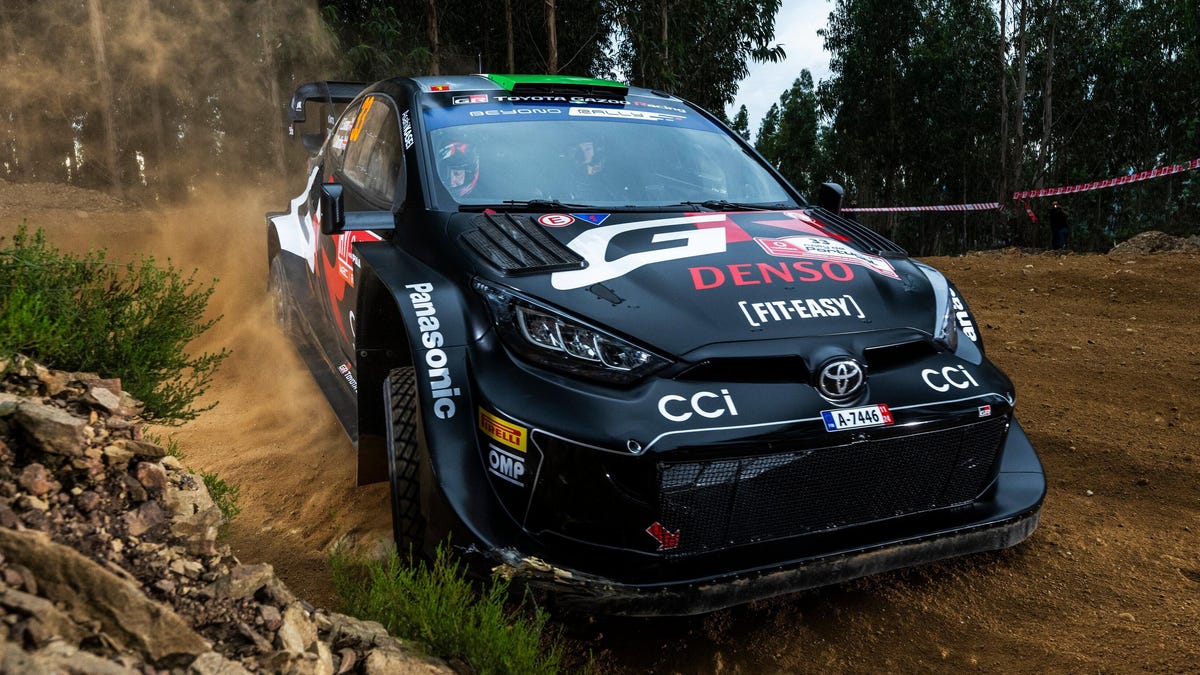The FIA, in an effort to bolster entries for each round of the World Rally Championship, is looking for ways to make the series less expensive and more competitive. A new set of regulations will be implemented for 2027, but in the meantime it has suggested the current top-level Rally 1 cars from Toyota, Hyundai, and Ford be run without power-boosting hybrid units, a tighter restrictor be fitted to reduce engine power, and each car be given less downforce to reduce speeds. The manufacturers and drivers hate this idea, but Toyota built and tested its current GR Yaris car in that proposed specification anyway. To put it bluntly, it sucked ass.
In this tweet from Twitter user @llluis555 you can see the closed off hybrid vents and the smaller rear wing implemented for the Toyota test. It’s instantly obvious that this car would be much slower, lacking the impressive rear downforce of the 2024-spec Yaris, and running just 330 horsepower instead of the currently-allowed 500-plus.
All three current manufacturers have come together to formally request of the FIA that the current hybrid and downforce regulations stay in place until the end of 2026, allowing them to focus on building a new car for 2027. The drivers, likewise, have voiced their strong opposition to the proposed changes. After driving the modified Toyota, driver Elfyn Evans had this to say, in typical rally driver succinctness: “I can tell you that it was not so exciting.”
When asked if the car was drivable, he replied, “I started and finished my run, so I guess if that is your definition of drivable, then I guess it was.” When pushed for further explanation and his thoughts on whether the non-hybrid car was the right move for 2025, “My opinion is quite clear.”
The FIA appear to want to bring Rally1 cars down in speed while improving speed of the current Rally2 cars. This would allow a less expensive formula currently populated by privateers to be competitive with the factory efforts for overall WRC victories. It’s obvious that the FIA would prefer this as it reduces the impact Toyota, Ford, and Hyundai have on the series if they were to back out, but it also reduces the chances of the factory teams to deliver headline-garnering victories at rallies around the world. Why would they continue to spend hundreds of millions of dollars developing these cars to be beat by a local in a Skoda?
Each of the three manufacturers currently runs between two and four drivers in each rally, making for a grid of eight-ish Rally1 competitors at each round. The less expensive Rally2 this season has seen another dozen or more drivers at each round. If the two classes were to converge, this would allow some twenty drivers to compete for the overall victory instead of the current crop of fewer than ten. Would that make for more interesting rally? Maybe. But one could argue that the power and downforce of the current-spec Rally1 cars is what makes the sport compelling, and taking that away would negatively impact rally altogether.
I mean, you can’t watch that onboard of Ott Tänak running his Hyundai in Croatia without getting a little excited. Now imagine the same car with significantly less downforce and significantly less power. Would it be as fun to watch?
Drivers like Tänak, Lappi, Ogier, Evans, and Rovanperä will figure out how to get to the front of the pack regardless of the power levels of their cars, but it’s far more interesting to watch them tame these fire-breathing beasts. The current WRC Rally1 cars are significantly faster and more exciting to watch than any era of WRC that has come before it, and I think that’s a lot of the appeal of the series. If anything, I’d argue that the cars could do with another 100 to 200 horsepower. Why not?

